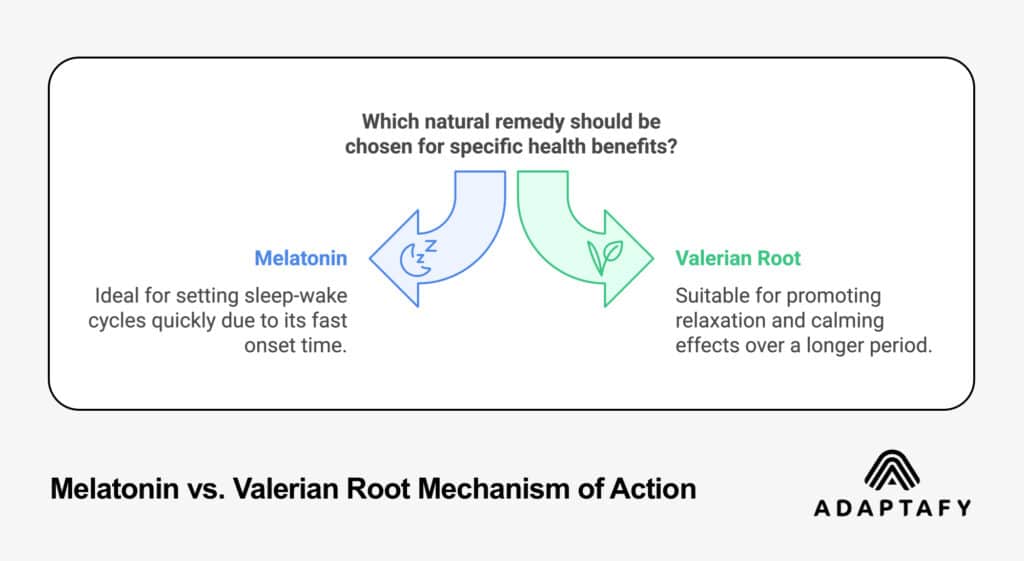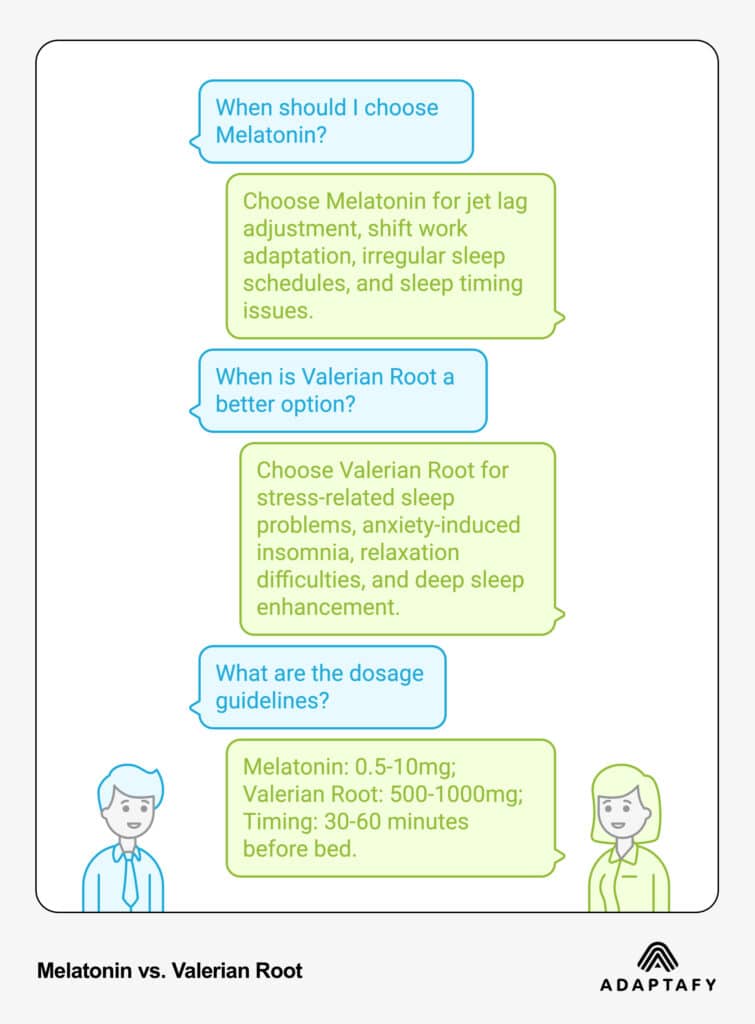Melatonin vs Valerian Root: Find the Best Natural Sleep Solution
Staring at the ceiling at 2 AM again? You’re not alone in the battle for better sleep. Natural sleep aids like melatonin and valerian root have become increasingly popular solutions, with melatonin use among US adults jumping from 0.4% to 2.1% between 1999 and 2018 (Source: Nature Made).
As a dad juggling work deadlines and family commitments, quality sleep isn’t just a luxury – it’s essential for staying sharp and energized. Both melatonin and valerian root offer natural paths to better rest, but they work differently and suit different sleep challenges.
Your body naturally produces melatonin to regulate sleep cycles, while valerian root contains compounds that promote relaxation through GABA receptors. Understanding these differences helps you choose the right supplement for your specific sleep needs.
This guide breaks down seven crucial differences between melatonin vs valerian root, from how they work to when they’re most effective. We’ll explore the science behind each supplement and help you make an informed decision for your sleep
routine.CopyAdd to document

1. How These Natural Sleep Aids Work
Understanding the mechanism behind each sleep aid reveals why they might work differently for your specific situation. While melatonin is a relative newcomer to sleep science, valerian root brings over 2,000 years of historical use dating back to ancient Greece and Rome (Source: Cannovia).
Your brain naturally produces melatonin when darkness falls, signaling your body to prepare for sleep. This hormone works directly with your hypothalamus, the brain’s sleep command center, coordinating your natural sleep-wake rhythm with environmental light cycles.
Valerian root takes a different approach to promoting sleep. Its active compounds, including valerenic acid and valerenol, enhance GABA activity in your brain. GABA acts as your body’s natural calm-down signal, helping quiet an overactive mind.
| Feature | Melatonin | Valerian Root |
| Primary Action | Regulates sleep-wake cycle | Promotes relaxation |
| Brain Target | Hypothalamus | GABA receptors |
| Natural Production | Produced by pineal gland | Plant-based compound |
| Best For | Sleep timing issues | Relaxation difficulties |
Think of melatonin as your body’s internal clock setter. When you take a supplement, you’re essentially telling your brain, “Hey, it’s time to wind down,” similar to how darkness naturally triggers sleep preparation. This makes it particularly effective for circadian rhythm disorders.
Valerian root functions more like your body’s natural relaxation system amplifier. By supporting GABA activity, it helps calm the mental chatter that often keeps you staring at the ceiling instead of drifting off to sleep. This difference in mechanism explains why some people respond better to one supplement over the other.
2. Speed and Effectiveness
When you’re exhausted after a long day of meetings and family responsibilities, waiting hours for a sleep aid to kick in isn’t ideal. Studies show melatonin supplements can reduce the time it takes to fall asleep by approximately 7 minutes (Source: Tahiro).
Melatonin typically starts working within 30 minutes of taking it. This quick action makes it particularly effective for those nights when you need to adjust your sleep schedule for an early morning presentation or recover from jet lag after a business trip.
Valerian root takes a more gradual approach to improving sleep. Rather than providing immediate relief, it builds effectiveness over several days of consistent use. This slower onset means you’ll want to plan ahead when starting valerian root supplementation.
The effectiveness of each supplement also differs based on your specific sleep challenge. Melatonin shines when dealing with timing-related sleep issues, like adjusting to a new work schedule or managing irregular sleep patterns. Its predictable action helps reset your internal clock.
Valerian root excels at addressing sleep difficulties related to restlessness or difficulty relaxing. While it might take longer to notice results, many users report deeper, more satisfying sleep once the effects build up in their system.
For busy professionals dealing with occasional sleep disruptions, melatonin’s quick action provides a reliable solution. However, if you’re facing ongoing sleep challenges related to stress or anxiety, valerian root’s cumulative benefits might better suit your needs.
3. Sleep Quality Benefits
Quality sleep isn’t just about falling asleep faster – it’s about staying asleep and getting restorative rest. Research shows melatonin supplementation can increase total sleep duration by approximately 8 minutes compared to placebo (Source: Life Extension).
Melatonin’s impact on sleep quality focuses primarily on maintaining your natural sleep cycle. When your internal clock runs smoothly, you’re more likely to progress through sleep stages naturally, leading to more refreshing rest.
Valerian root approaches sleep quality differently by promoting deeper sleep stages. Its interaction with GABA receptors helps quiet the mental chatter that often disrupts deep sleep, particularly beneficial for those who tend to sleep lightly or wake frequently during the night.
For parents juggling work and family life, the type of sleep improvement each supplement offers matters significantly. Melatonin helps establish a more predictable sleep pattern, making it easier to maintain consistent bedtime routines despite changing daily demands.
Sleep quality directly impacts testosterone levels and overall male health. Valerian root’s ability to enhance deep sleep stages may provide additional benefits for hormone regulation and physical recovery, especially important for active professionals maintaining regular exercise routines.
Both supplements can improve your morning energy levels, but through different mechanisms. Melatonin users often report feeling more in sync with their natural wake times, while valerian root users frequently notice feeling more thoroughly rested due to improved sleep depth.
4. Stress and Anxiety Effects
When deadlines loom and family responsibilities pile up, stress and anxiety often become unwelcome bedtime companions. Here’s where the distinction between these supplements becomes particularly relevant. Valerian root shows significant anxiolytic (anxiety-reducing) properties, while melatonin primarily focuses on sleep timing (Source: Medical News Today).
Valerian root’s stress-relieving properties make it especially valuable for professionals dealing with work-related tension. Its natural calming effect helps quiet racing thoughts and reduce the mental load that often prevents quality sleep.
Melatonin, while effective for sleep timing, doesn’t directly address anxiety or stress. Think of it as setting your body’s clock rather than calming your mind. This distinction becomes crucial when choosing the right supplement for your specific sleep challenges.
For those nights when you’re physically tired but mentally wired, valerian root’s dual action on both sleep and anxiety can be particularly beneficial. It helps create the mental quiet needed to transition from a busy day to restful sleep.
Managing anxiety naturally becomes increasingly important as we balance career growth with family life. Valerian root’s ability to promote relaxation without causing next-day grogginess makes it a practical choice for busy professionals.
Understanding this difference in stress management can help you make a more informed choice. If your sleep issues stem primarily from anxiety or stress, valerian root might offer more comprehensive support for your needs.
5. Dosage and Timing Guidelines
Getting the timing and dosage right can make the difference between effective sleep support and wasted effort. Melatonin supplements typically range from 0.5 to 10 mg, with experts recommending starting at the lower end (Source: Nature Made).
Optimal melatonin timing matters significantly. Take it 30-60 minutes before your target bedtime, allowing your body to recognize and respond to the sleep signal. This timing works well for most busy professionals wrapping up evening responsibilities.
Valerian root follows a different protocol, typically requiring 500-1000 mg taken 30-60 minutes before bed. Unlike melatonin, valerian root benefits from consistent daily use, as its effects build over time. This makes it ideal for establishing a regular sleep routine.
For those managing unpredictable schedules, melatonin offers more flexibility. You can adjust timing based on when you need to sleep, whether it’s your regular bedtime or adapting to temporary schedule changes. This flexibility particularly benefits those dealing with varying work shifts or travel.
Understanding your circadian rhythm helps optimize supplement timing. Melatonin works best when taken at roughly the same time each night, while valerian root’s relaxation benefits can be felt even with slight timing variations.
Start with the lowest effective dose of either supplement and adjust based on your response. This patient approach helps minimize side effects while identifying your optimal dosage. Remember, more isn’t always better when it comes to sleep supplements.
6. Choosing the Right Option
With over 3.065 million US adults using melatonin supplements alone (Source: Life Extension), choosing the right sleep aid matters. Your specific sleep challenges and lifestyle should guide your decision between melatonin and valerian root.
Choose melatonin if you’re dealing with:
- Jet lag or travel-related sleep disruption
- Shift work sleep adjustments
- Irregular sleep schedules
- Difficulty with sleep timing
Opt for valerian root when facing:
- Stress-related sleep issues
- Anxiety-induced insomnia
- Difficulty relaxing before bed
- Need for deeper, more restorative sleep

Quality sleep directly impacts male hormones and overall health. Consider your daily routine, stress levels, and specific sleep challenges when making your choice. Some individuals even benefit from using both supplements strategically.
For busy professionals and parents, practical considerations matter. Melatonin’s quick action suits those needing immediate sleep support, while valerian root’s cumulative benefits work better for establishing long-term sleep habits.
Understanding the connection between sleep and hormonal health can help inform your decision. Both supplements can support overall well-being, but their different mechanisms mean they excel in different situations.
Conclusion
Choosing between melatonin and valerian root doesn’t have to feel like another item on your endless to-do list. Both supplements offer viable paths to better sleep, each with its unique strengths. Melatonin excels at regulating sleep timing, while valerian root shines in promoting relaxation and deeper rest.
Your ideal choice depends on your specific sleep challenges. If you’re wrestling with jet lag or irregular schedules, melatonin provides quick, targeted support. For those nights when stress keeps your mind racing, valerian root’s natural calming properties might better serve your needs.
Remember, quality sleep isn’t just about getting through the next day – it’s about maintaining long-term health and vitality. Poor sleep can significantly impact testosterone levels and overall well-being, making it crucial for busy professionals and parents to prioritize rest.
Ready to take control of your sleep quality? Start with the supplement that best matches your primary sleep challenge. Monitor your response over a few weeks, keeping notes on sleep quality and morning energy levels. This practical approach helps you fine-tune your sleep strategy for optimal results.
Looking for a comprehensive sleep solution? Check out our supplement, specifically formulated to support quality sleep and stress relief. It combines carefully selected natural ingredients to help you wind down naturally and wake up refreshed, ready to tackle whatever challenges tomorrow brings. †


